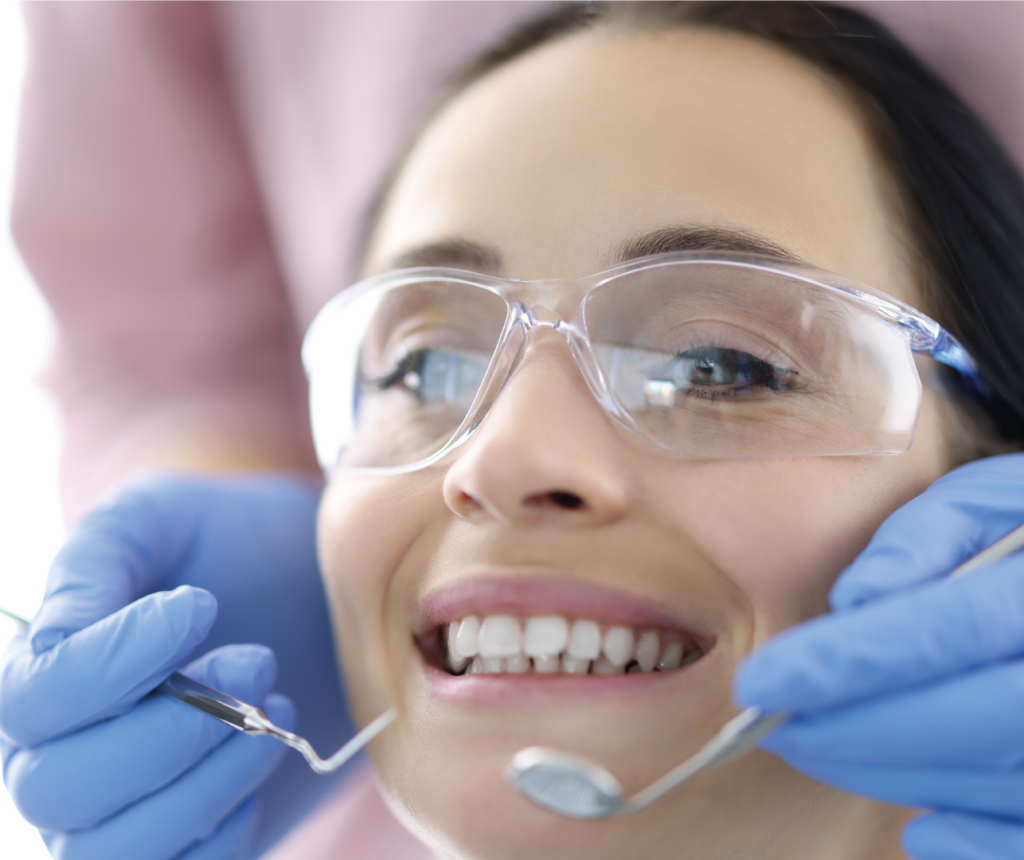Preventive Dentistry
Preventive dentistry is the practice of caring for your teeth to keep them healthy. This helps to avoid cavities, gum disease, enamel wear, and more.
There are many forms of preventive dentistry, such as daily brushing and dental cleanings. To maintain optimal oral health, the American Dental Association (ADA) recommends visits to the dentist at regular intervals of 6 months. These practices are designed to ensure that teeth are clean, strong, and white.

What Does Preventive
Dentistry Do?
Preventive dentistry prevents people from developing dental problems later on. If you use proper dental care, you can avoid or lessen the effects of these:

What Does Preventive Dentistry Do?
Everyone benefits from preventive dentistry. Children, in particular, benefit because it allows their newly developing adult teeth to come in strong and healthy. Dental sealants and topical fluoride treatments help prevent decay in your children’s teeth. If you’re an aging adult, you can benefit from preventive dentistry because it helps you to keep your real teeth.
Oral health is connected to the health of your body as a whole. This is because the mouth is a breeding ground for harmful bacteria. Maintaining a clean mouth benefits your overall health.

Dental Comprehensive
exams (6 months Checkups):
An all-inclusive assessment and recording of all hard and soft, intra, and extraoral tissues is a comprehensive oral exam.
Additionally, a dental checkup or re-care exam refers to an examination that is done on current patients. This allows dentists to find out any changes in a person’s health status and dental condition since a previous periodic or comprehensive evaluation. Some of us know that our mouth serves as the window into the body. In relation to this, dentists can discover different medical conditions through a comprehensive oral exam before symptoms emerge in the body. Cardiovascular problems, undiagnosed or poorly-controlled diabetes, sinus problems, systemic disorders such as oral cancer, high blood pressure, and immune abnormalities are just some examples. By performing a comprehensive exam, dental professionals can formulate a strategy for long-term dental and overall health.
Dental x-rays:
Dental X-Rays are an essential part of any dental care treatment plan. They are diagnostic, but they can also be preventative, by helping a dentist diagnose potential oral care issues in a patient’s mouth before they become a major problem. An x-ray is a type of energy that passes through soft tissues and is absorbed by dense tissue. Teeth and bone are very dense, so they absorb X-rays, while X-rays pass more easily through gums and cheeks.
X-rays are divided into two main categories, intraoral and extraoral. Intraoral is an X-ray that is taken inside the mouth. An extraoral X-ray is taken outside of the mouth.
Intraoral X-rays are the most common type of radiograph taken in dentistry. They give a high level of detail of the tooth, bone and supporting tissues of the mouth. These X-rays allow dentists to:
Find cavities, look at the tooth roots, check the health of the bony area around the tooth, determine if periodontal disease is an oral care issue, see the status of developing teeth. Otherwise, monitor good tooth health through prevention.





Dental Cleanings:
Having your teeth cleaned can prevent gum disease, which leads to early tooth loss. … A strong link exists between cardiovascular disease and gum disease. Because getting your teeth cleaned twice a year helps prevent gum disease, it can also reduce your chances of potentially deadly heart attacks and strokes. Certain bacteria in dental plaque can grow in numbers and lead into cavities (holes in the teeth) or gum disease. A dental clean will reduce your chance of getting cavities or gum disease by significantly reducing the amount of plaque and calculus in your mouth.
Sealants:
Having your teeth cleaned can prevent gum disease, which leads to early tooth loss. … A strong link exists between cardiovascular disease and gum disease. Because getting your teeth cleaned twice a year helps prevent gum disease, it can also reduce your chances of potentially deadly heart attacks and strokes. Certain bacteria in dental plaque can grow in numbers and lead into cavities (holes in the teeth) or gum disease. A dental clean will reduce your chance of getting cavities or gum disease by significantly reducing the amount of plaque and calculus in your mouth.

Fluoride:
What are the benefits of fluoride?
Fluoride is beneficial to teeth because it helps to:




When bacteria in your mouth break down sugar and carbs, they produce acids that eat away at the minerals in your tooth enamel. This loss of minerals is called demineralization. Weakened tooth enamel leaves your teeth vulnerable to bacteria that cause cavities.
Fluoride helps to remineralize your tooth enamel, which can prevent cavities and reverse early signs of tooth decay.
Fluoride has significant health benefits for children and adults. Tooth decay is often problematic for middle-aged and older adults, especially decay around the roots resulting from a receding gumline.
Dental caries (cavities) is a disease that can be acquired at any point in a person’s life. Early studies showed that water fluoridation reduced the amount of cavities children get in their baby teeth by as much as 60 percent and reduced tooth decay in permanent adult teeth nearly 35 percent. Today, studies prove water fluoridation continues to be effective in reducing tooth decay by 20-40 percent, even in an era with widespread availability of fluoride from other sources, such as fluoride toothpaste.
Our Location
POWER BY MOMOS DESIGN
© Copyright Andina Dental Health I © 2020 ALL RIGHTS RESERVED

